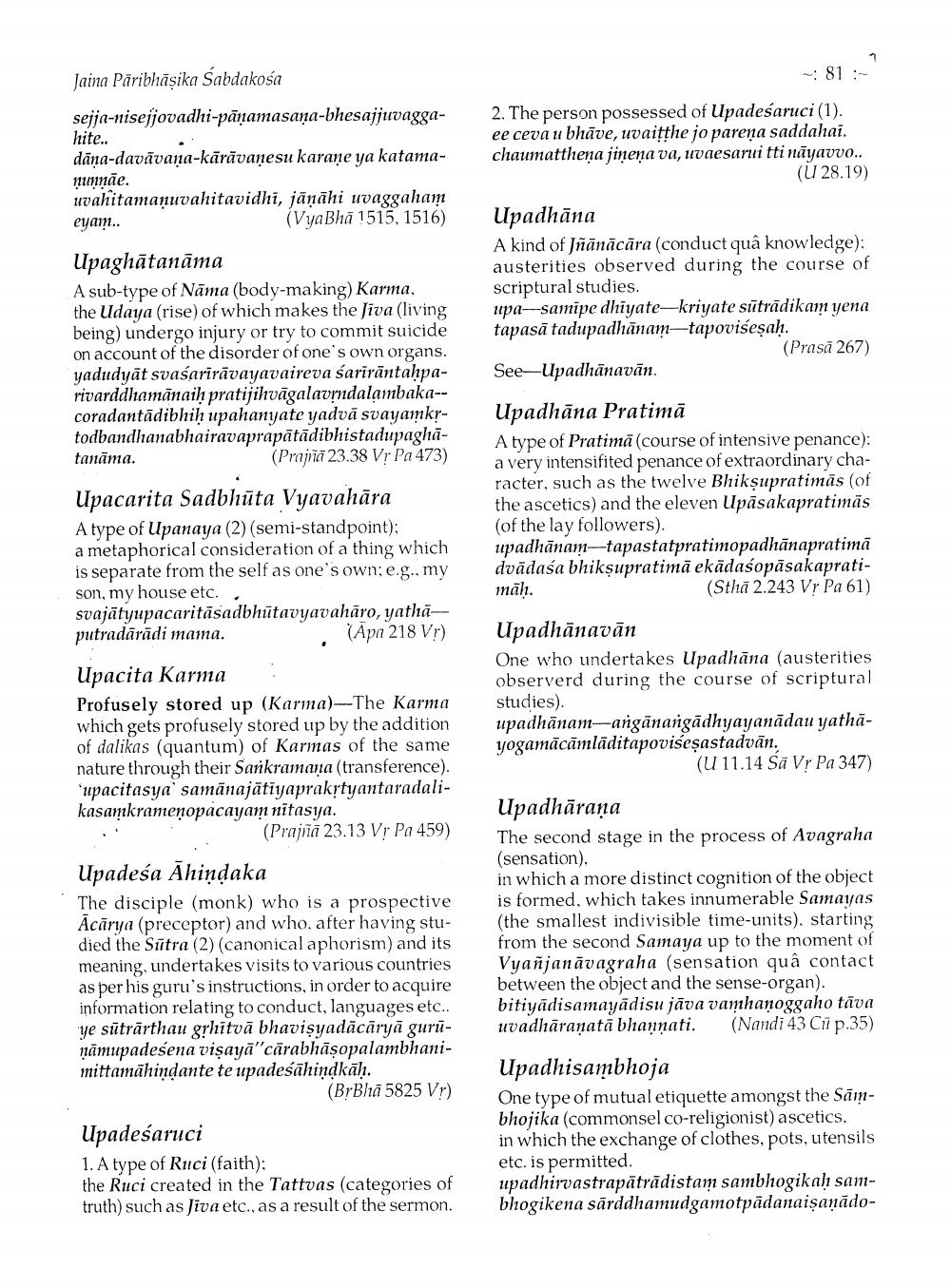________________
-: 81
Jaina Pāribhāșika Sabdakosa sejja-nisejjovadhi-pāṇamasaņa-bhesajjuvaggahite.. dāna-davāvana-kārāvanesu karane ya katamanunnae. uvahitamaņuvahitavidhi, jāņāhi uvaggaham eyam..
(Vya Bhā 1515, 1516)
2. The person possessed of Upadeśaruci (1). ee ceva u bhāve, uvaitthe jo parena saddahai. chaumatthena jiņeņa va, uvaesarui tti nāyavvo..
(U 28.19)
Upaghātanāma A sub-type of Nāma (body-making) Karma, the Udaya (rise) of which makes the Jiva (living being) undergo injury or try to commit suicide on account of the disorder of one's own organs. yadudyāt svasarīrāvayavaireva sarirāntahparivarddhamanaih pratijihvāgalavrndalambaka-- coradantādibhiḥ upahanyate yadvā svayamkrtodbandhanabhairavaprapātādibhistadupaghātanāma.
(Prajā 23.38 V? Pa 473)
Upadhāna A kind of Jñānācāra (conduct quâ knowledge): austerities observed during the course of scriptural studies. upa---samipe dhiyate-kriyate sūtrādikam yena tapasā tadupadhānam-tapovišeşah.
(Prasā 267) See-Upadhānavān.
Upacarita Sadbhūta Vyavahāra A type of Upanaya (2) (semi-standpoint); a metaphorical consideration of a thing which is separate from the self as one's own; e.g.. my son, my house etc., svajātyupacaritāsadbhutavyavahāro, yathā-- putradārādi mama.
(Apr 218 Vr)
Upadhāna Pratimā A type of Pratimā (course of intensive penance): a very intensifited penance of extraordinary character, such as the twelve Bhikṣupratimas (of the ascetics) and the eleven Upāsakapratimās (of the lay followers). upadhānam-tapastatpratimopadhānapratimā dvādaśa bhikṣupratimā ekādasopāsakapratimāh.
(Sthā 2.243 Vr Pa 61)
Upacita Karma : Profusely stored up (Karma)-The Karma which gets profusely stored up by the addition of dalikas (quantum) of Karinas of the same nature through their Sarkramana (transference). ‘upacitasya' samānajātiyaprakṣtyantaradalikasamkramenopacayam nitasya.
(Prajna 23.13 V! Pa 459)
Upadhānavān One who undertakes Upadhāna (austerities observerd during the course of scriptural studies). upadhānam--angānangādhyayanādau yathāyogamācāmlāditapovišeşastadvān.
(U 11.14 Sa Vr Pa 347)
Upadeśa Āhindaka The disciple (monk) who is a prospective Acārya (preceptor) and who, after having studied the Sūtra (2) (canonical aphorism) and its meaning, undertakes visits to various countries as per his guru's instructions, in order to acquire information relating to conduct, languages etc.. 'ye sütrārthau gļhitvā bhavisyadācāryā gurunāmupadesena visayā"cārabhāsopalambhanimittamāhindante te upadeśāhindkāḥ.
(BrBhā 5825 Vr)
Upadhārana The second stage in the process of Avagraha (sensation), in which a more distinct cognition of the object is formed, which takes innumerable Samaias (the smallest indivisible time-units), starting from the second Samaya up to the moment of Vyañjanāvagraha (sensation quâ contact between the object and the sense-organ). bitiyādisamayādisu jāva vamhanoggaho tāva uvadhāraṇatā bhannati. (Nandi 43 Cap.35)
Upadeśaruci 1. A type of Ruci (faith): the Ruci created in the Tattvas (categories of truth) such as Jiva etc., as a result of the sermon.
Upadhisambhoja One type of mutual etiquette amongst the Sāinbhojika (commonsel co-religionist) ascetics, in which the exchange of clothes, pots, utensils etc. is permitted. upadhirvastrapātrādistam sambhogikah sambhogikena sārddhamudgamotpādanaişaņādo




